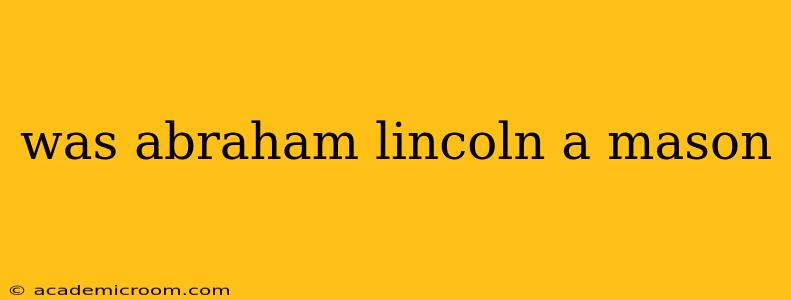Abraham Lincoln, the 16th President of the United States, remains a figure of immense fascination and study. His life, his presidency, and even his personal beliefs continue to spark debate and investigation. Among the many questions surrounding Lincoln's life, one persistently arises: Was Abraham Lincoln a Mason? The answer, while seemingly straightforward, reveals a fascinating glimpse into the history of Freemasonry and Lincoln's own enigmatic persona.
The short answer is yes, historical evidence strongly suggests Abraham Lincoln was indeed a Freemason. However, the extent of his involvement and the significance he placed on his Masonic affiliation are subjects of ongoing discussion.
What Evidence Suggests Abraham Lincoln Was a Mason?
Several pieces of evidence point towards Lincoln's Masonic membership:
-
Membership Records: Records from several Masonic lodges confirm Lincoln's initiation, advancement through the degrees, and active participation. While the exact dates and specific lodges vary slightly depending on the source, the overall consensus points towards his involvement.
-
Ritual and Symbolism: Lincoln's speeches and writings often incorporated Masonic symbolism and rhetoric. Scholars have identified subtle allusions to Masonic principles and ideals in his addresses, suggesting a deep understanding and appreciation of the fraternity's values.
-
Personal Accounts and Testimonials: Numerous accounts from individuals who knew Lincoln personally attest to his Masonic membership and his active participation in lodge activities. These accounts provide valuable firsthand perspectives on Lincoln's connection to the fraternity.
-
Masonic Honors: Lincoln received various Masonic honors and recognitions throughout his life, further confirming his association with the organization. These honors highlight the fraternity's acknowledgment of his contributions and standing within the Masonic community.
Was Abraham Lincoln a Practicing Mason? The Extent of His Involvement
While the evidence for Lincoln's membership is strong, the extent of his active participation is a matter of some debate. While some accounts depict him as a regular attendee of lodge meetings and actively involved in Masonic affairs, others suggest his involvement fluctuated due to the demands of his political career.
It's important to remember that the 19th century saw a different societal landscape regarding Freemasonry. Membership was far more common, and it held significant social and political weight. Lincoln's involvement may have been a reflection of this societal context, rather than solely an indication of deeply held personal beliefs.
How Did His Masonic Beliefs Influence His Presidency?
This question is central to understanding the intersection of Lincoln's personal life and his public service. Some historians argue that his Masonic principles, emphasizing brotherhood, equality, and moral virtue, informed his leadership during the Civil War and his commitment to national unity. Others suggest that while his Masonic affiliation was a part of his identity, it didn't significantly shape his political decisions.
The influence of his Masonic beliefs on his presidency remains a subject of scholarly debate and interpretation.
What Were the Main Principles of Freemasonry During Lincoln's Time?
Freemasonry in Lincoln's era emphasized several core tenets:
- Brotherhood: A strong emphasis on fraternity and mutual support among members.
- Charity: A commitment to philanthropic endeavors and assisting those in need.
- Moral uprightness: Promoting high moral standards and ethical conduct among its members.
- Symbolic Rituals: Employing symbolic rituals and ceremonies to convey moral and philosophical lessons.
Did Lincoln's Masonic Affiliation Affect His Political Career?
Lincoln's Masonic affiliation likely played a role in his political career, albeit indirectly. Freemasonry was a significant social network in the 19th century, providing connections and opportunities. It is possible this network helped him build relationships that proved beneficial in his rise to prominence. However, to suggest it was a primary driver of his success would be an oversimplification.
In conclusion, while the evidence overwhelmingly supports Abraham Lincoln's membership in the Freemasons, the depth and influence of his affiliation remain subjects of ongoing scholarly discussion. However, the fact of his membership is undeniable and adds another layer to the complex and fascinating legacy of the 16th President.
